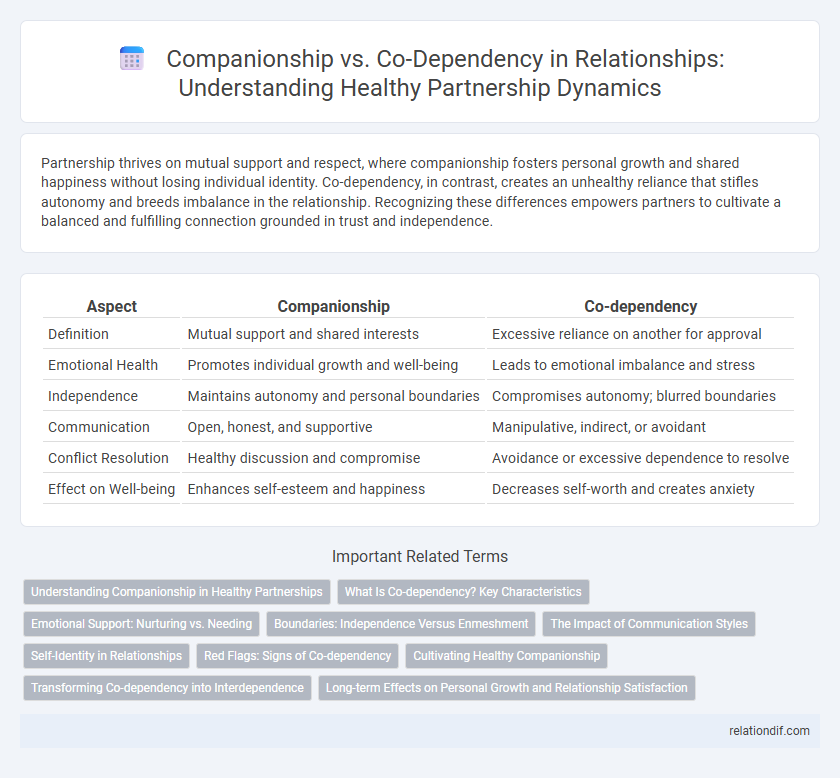Partnership thrives on mutual support and respect, where companionship fosters personal growth and shared happiness without losing individual identity. Co-dependency, in contrast, creates an unhealthy reliance that stifles autonomy and breeds imbalance in the relationship. Recognizing these differences empowers partners to cultivate a balanced and fulfilling connection grounded in trust and independence.
Table of Comparison
| Aspect | Companionship | Co-dependency |
|---|---|---|
| Definition | Mutual support and shared interests | Excessive reliance on another for approval |
| Emotional Health | Promotes individual growth and well-being | Leads to emotional imbalance and stress |
| Independence | Maintains autonomy and personal boundaries | Compromises autonomy; blurred boundaries |
| Communication | Open, honest, and supportive | Manipulative, indirect, or avoidant |
| Conflict Resolution | Healthy discussion and compromise | Avoidance or excessive dependence to resolve |
| Effect on Well-being | Enhances self-esteem and happiness | Decreases self-worth and creates anxiety |
Understanding Companionship in Healthy Partnerships
Understanding companionship in healthy partnerships involves recognizing mutual support without losing individual autonomy. True companionship fosters emotional intimacy and trust while encouraging personal growth and boundaries. It contrasts with co-dependency, where reliance on the partner becomes excessive and undermines self-sufficiency.
What Is Co-dependency? Key Characteristics
Co-dependency is an unhealthy relationship pattern where one partner excessively relies on the other for emotional support and identity, often at the expense of personal autonomy. Key characteristics include a compulsive need to please, difficulty setting boundaries, low self-esteem, and an imbalance of power or responsibility. This dynamic fosters emotional dependency rather than mutual support, hindering individual growth and a balanced partnership.
Emotional Support: Nurturing vs. Needing
Emotional support in companionship fosters mutual growth and nurtures individual well-being, creating a balanced partnership where both parties feel valued and empowered. In contrast, co-dependency often hinges on emotional needing, where one partner relies excessively on the other for validation and stability, leading to imbalance and potential burnout. Healthy partnerships emphasize nurturing emotional support, encouraging independence and resilience within the relationship.
Boundaries: Independence Versus Enmeshment
Healthy partnerships thrive on clear boundaries that foster independence while preventing enmeshment, ensuring each individual maintains their identity and autonomy. Companionship supports mutual respect and personal growth, whereas co-dependency blurs boundaries, leading to excessive emotional reliance and loss of self. Establishing and maintaining these boundaries is crucial for balanced relationships that nurture both connection and individuality.
The Impact of Communication Styles
Effective communication styles play a crucial role in distinguishing healthy companionship from co-dependency within partnerships. Open, honest dialogues foster mutual respect and individual growth, while patterns of controlling or avoidant communication often signal co-dependent dynamics. Prioritizing empathetic listening and clear boundaries enhances partnership resilience and emotional well-being.
Self-Identity in Relationships
Healthy partnerships nurture self-identity by encouraging individual growth and mutual respect, preventing the loss of personal boundaries. Companionship thrives on balance, where partners support each other's independence while sharing emotional intimacy. Co-dependency undermines self-identity through excessive reliance on one another, often leading to diminished autonomy and emotional well-being.
Red Flags: Signs of Co-dependency
Red flags of co-dependency in partnerships include an excessive reliance on a partner for self-worth and decision-making, leading to a loss of personal identity. Frequent enabling behaviors, such as covering up a partner's mistakes or neglecting personal boundaries, signal unhealthy attachment patterns. Persistent feelings of anxiety when apart and difficulty asserting individual needs highlight emotional imbalance characteristic of co-dependent relationships.
Cultivating Healthy Companionship
Cultivating healthy companionship involves fostering mutual respect, trust, and emotional support without losing individual autonomy. Partners maintain their personal identities while sharing experiences, encouraging growth and balanced interdependence. This dynamic contrasts with co-dependency, where reliance on each other becomes excessive, hindering personal development and creating unhealthy attachments.
Transforming Co-dependency into Interdependence
Transforming co-dependency into interdependence promotes healthy partnerships where both individuals maintain personal boundaries while supporting each other's growth. Establishing mutual respect and open communication enables partners to rely on one another without losing their sense of self. This shift enhances emotional resilience and fosters balanced companionship rooted in trust and autonomy.
Long-term Effects on Personal Growth and Relationship Satisfaction
Companionship fosters mutual support and individual growth, enhancing long-term relationship satisfaction by promoting balanced interdependence and personal development. Co-dependency often hinders self-awareness and emotional autonomy, leading to stagnation and increased relational stress over time. Sustainable partnerships thrive on healthy boundaries that encourage growth within the relationship while maintaining each partner's sense of self.
Companionship vs Co-dependency Infographic

 relationdif.com
relationdif.com